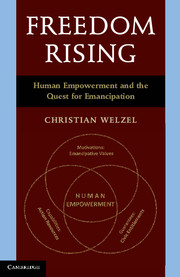Crossref Citations
This Book has been
cited by the following publications. This list is generated based on data provided by Crossref.
Delhey, Jan
and
Welzel, Christian
2012.
Generalizing Trust: How Outgroup-Trust Grows Beyond Ingroup-Trust.
SSRN Electronic Journal,
Dalton, Russell J.
and
Shin, Doh Chull
2013.
Growing Up Democratic: Generational Change in East Asian Democracies.
SSRN Electronic Journal,
Genov, Nikolai
2013.
Challenges of individualisation.
International Social Science Journal,
Vol. 64,
Issue. 213-214,
p.
197.
Inglehart, Ronald
and
Welzel, Christian
2013.
Reinventing the Kantean Peace: The Emerging Mass Basis of Global Security.
SSRN Electronic Journal,
Diener, Ed
Inglehart, Ronald
and
Tay, Louis
2013.
Theory and Validity of Life Satisfaction Scales.
Social Indicators Research,
Vol. 112,
Issue. 3,
p.
497.
Balmas, Meital
and
Sheafer, Tamir
2013.
Leaders First, Countries After: Mediated Political Personalization in the International Arena.
Journal of Communication,
Vol. 63,
Issue. 3,
p.
454.
Alexander, Amy C.
Welzel, Christian
and
Inglehart, Ronald
2013.
Rising Support for Reproductive Freedoms: Emancipatory Breakthroughs into a Bulwark of Tradition.
SSRN Electronic Journal,
Welzel, Christian
and
Inglehart, Ronald
2013.
Evolution, Empowerment and Emancipation: How Societies Ascend the Utility Ladder of Freedoms.
SSRN Electronic Journal,
Inglehart, Marita R.
2014.
The Civic Culture Transformed.
p.
xix.
Ranganathan, Shyam
Spaiser, Viktoria
Mann, Richard P.
Sumpter, David J. T.
and
Rapallo, Fabio
2014.
Bayesian Dynamical Systems Modelling in the Social Sciences.
PLoS ONE,
Vol. 9,
Issue. 1,
p.
e86468.
Kanji, Mebs
and
Tannahill, Kerry Lynne
2014.
Outlooks toward Democracy in Quebec.
Open Journal of Political Science,
Vol. 04,
Issue. 04,
p.
291.
DALTON, RUSSELL
and
SHIN, DOH CHULL
2014.
Growing up Democratic: Generational Change in East Asian Democracies.
Japanese Journal of Political Science,
Vol. 15,
Issue. 3,
p.
345.
van Deth, Jan W.
2014.
Demokratie in der Großstadt.
p.
1.
Bavetta, Sebastiano
Navarra, Pietro
and
Maimone, Dario
2014.
Freedom and the Pursuit of Happiness.
Delhey, Jan
Newton, Kenneth
and
Welzel, Christian
2014.
The Radius of Trust Problem Remains Resolved.
American Sociological Review,
Vol. 79,
Issue. 6,
p.
1260.
Schubert, Sophia
2014.
On the Assessment of ‘Civilizations’ in Political Culture Research. Criticism and Alternative.
Comparative Sociology,
Vol. 13,
Issue. 5,
p.
556.
Spaiser, Viktoria
Ranganathan, Shyam
Mann, Richard P.
Sumpter, David J. T.
and
Chialvo, Dante R.
2014.
The Dynamics of Democracy, Development and Cultural Values.
PLoS ONE,
Vol. 9,
Issue. 6,
p.
e97856.
Lei, Xuchuan
and
Lu, Jie
2014.
Incidental Emotions, Provisional Priming, and Political Trust: Survey Experiments on the Robustness of Political Trust among Chinese College Freshmen.
SSRN Electronic Journal,
Kravtsova, Maria
Oshchepkov, Aleksey Y.
and
Welzel, Christian
2014.
Corruption and Social Values: Do Postmaterialists Justify Bribery?.
SSRN Electronic Journal,
Dunn, Kris
2014.
Authoritarianism and Intolerance Under Autocratic and Democratic Regimes.
Journal of Social and Political Psychology,
Vol. 2,
Issue. 1,
p.
220.





